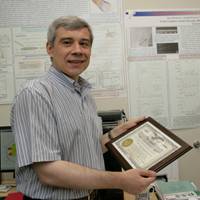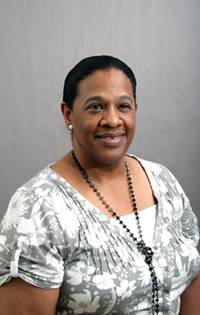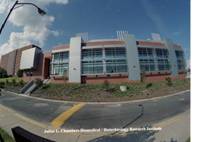
Dr. Igor V. Bondarev, associate professor of physics at North Carolina Central University, and two other scientists have been awarded a patent for a device to scan extremely smooth surfaces to identify the tiniest flaws. The device, called a carbon nanotube oscillator, has a wide range of potential applications in industrial, research and university laboratories and in manufacturing.
“When you need an extremely clean, flat solid surface, you can never get it, even if you polish,” Bondarev says. “Our device is able to sense surface roughness with a resolution that is two to three orders of magnitude better than that of currently available atomic force microscopes. That will make it possible to sort out ‘dirty’ sample surfaces from ‘clean’ ones.”
The new machine does not yet physically exist, Bondarev emphasizes. “The patent is for the concept,” he says. But there is good reason to think the oscillator has the potential to improve significantly on the performance of atomic force microscopes now in use. Many thousands of such microscopes are employed in laboratory and industrial settings around the world, and they range in price from $20,000 to more than $1 million.
Sharing in the patent with Bondarev are his long-term collaborators, University of South Florida (USF) physicists Adrian Popescu and Lilia Woods. The three scientists are named as the inventors, and the patent is assigned to their respective universities.
Carbon nanotubes are tiny long hollow structures, their walls formed by one-atom-thick sheets of carbon called graphene. They are among the stiffest and strongest fibers known, with remarkable electronic properties, and they have attracted huge academic and industrial interest.
In atomic force microscopes, a tiny, needle-like piece of metal functions as a mechanical probe, “feeling” a surface to detect flaws. The device developed by Bondarev and his USF collaborators replaces the metal piece with a double-walled carbon nanotube oscillator in which one cylindrical nanotube is contained and moves within another one of slightly larger diameter. The device will be able to measure a given surface profile at a resolution on the order of one nanometer — one billionth of a meter. A single molecule of water has a size of slightly less than one nanometer; a human hair is about 100,000 nanometers thick.
Any commercial payoff from the patent is likely to be years away. Dr. Undi Hoffler, NCCU’s director of research compliance, said NCCU and USF expect to explore options for licensing the concept to a manufacturer. “This is a long-term prospect,” Hoffler said, “but this invention should stand for awhile.”
Bondarev joined the NCCU faculty in 2005. A native of Belarus, the former Soviet republic, he holds a master’s degree and Ph.D. from the Belarusian State University in Minsk, and a Doctor of Science (D.Sc.) degree in theoretical solid-state physics from the National Academy of Sciences of the Republic of Belarus.
Bondarev said he’ll be pleased to see the machine he helped conceive become reality. “I’m a theoretical physicist. I’ve done my part of the job,” he said. “The experimentalists now need to build it and use it.”


 North Carolina Central University will welcome a new dean of the School of Law, Phyliss Craig-Taylor, in July. Craig-Taylor most recently served as associate dean for academics at Charlotte School of Law in Charlotte. Assuming the dean’s office marks a return to NCCU for Craig-Taylor, who served as a law professor from 2000 to 2006.
North Carolina Central University will welcome a new dean of the School of Law, Phyliss Craig-Taylor, in July. Craig-Taylor most recently served as associate dean for academics at Charlotte School of Law in Charlotte. Assuming the dean’s office marks a return to NCCU for Craig-Taylor, who served as a law professor from 2000 to 2006.

 Pointer emphasized the translational aspect of the projects — finding ways to use the research to directly improve health outcomes. “We really wanted to combine expertise from the various disciplines to make sure that our research conclusions can be directly applied in North Carolina communities,” she said. “This ‘bench-to-curbside’ philosophy is at the heart of CTHER.”
Pointer emphasized the translational aspect of the projects — finding ways to use the research to directly improve health outcomes. “We really wanted to combine expertise from the various disciplines to make sure that our research conclusions can be directly applied in North Carolina communities,” she said. “This ‘bench-to-curbside’ philosophy is at the heart of CTHER.”